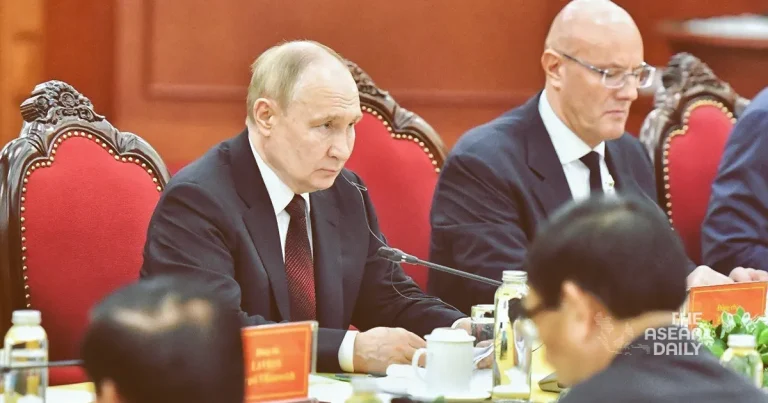21-6-2024 (HANOI) Russian President Vladimir Putin has emphasized his desire to build a “reliable security architecture” in the Asia-Pacific region during a state visit to Vietnam on Thursday (June 20), a move seen as a defiant display towards the West amid escalating tensions.
The visit, part of Putin’s tour through Asia, has drawn criticism from the United States and its allies, who view the Russian leader as a pariah and have protested against providing him a platform to defend Russia’s ongoing war in Ukraine.
A day after signing a mutual defense agreement with North Korea, Putin was welcomed with a 21-gun salute at a military ceremony in Vietnam. He was warmly embraced by two of the country’s Communist leaders and lavishly praised by one of them for contributing to “peace, stability, and development” worldwide.
Underscoring Russia’s pivot towards Asia in the face of Western sanctions over the Ukraine conflict, Putin and Vietnam signed agreements covering various areas, including energy.
“We are firmly committed to deepening the comprehensive strategic partnership with Vietnam, which remains among the priorities of Russia’s foreign policy,” Putin was quoted as saying by Russian media.
According to Russia’s TASS news agency, Putin stated that both countries shared an interest in “developing a reliable security architecture” in the region, based on principles of non-violence, peaceful dispute resolution, and excluding “closed military-political blocs.”
At a news conference concluding his trip, Putin accused the NATO military alliance of creating a security threat for Russia in Asia, as reported by TASS.
While the 11 pacts signed in Hanoi did not match the landmark mutual defense agreement with North Korea, Putin’s warm reception was a public relations victory for the Russian leader, who faces an outstanding International Criminal Court arrest warrant for alleged war crimes in Ukraine – charges he denies.
Neither Russia nor Vietnam is a member of the ICC.
“Putin’s triumphal reception in Hanoi will mark a counter-point to Russia’s recent setbacks,” said Carlyle Thayer, emeritus professor at the Australian Defence Force Academy, referring to the recent Ukraine conference in Switzerland and new European Union sanctions on Russia.
The Western sanctions are the latest imposed on Russia since its full-scale invasion of Ukraine in February 2022, which Moscow terms a “special military operation.”
Putin’s public relations blitz has been aided by the fact that Vietnam, unlike North Korea, maintains friendly relations with the United States and its allies, according to Zachary Abuza, a professor at the US National War College.
“Although there was a lot less of the fanfare and performative aspects than in North Korea, this visit was still important for Putin because Vietnam is actually an important actor in the global economy, not some comically evil pariah state,” Abuza said.
The military ceremony honoring Putin, during which he was embraced by Vietnamese President To Lam and Prime Minister Pham Minh Chinh, was of the caliber reserved for the highest heads of state, similar to the receptions given to US President Joe Biden and Chinese President Xi Jinping during their visits to Vietnam last year.
The two presidents witnessed the exchange of 11 agreements and memorandums of understanding, including deals on oil and gas, nuclear science, and education.
At another event, Lam commended Putin for leading Russia “overcoming all difficulties and challenges, at the same time contributing to the peace, stability, and development in the region and the world.”
Abuza highlighted the shared Communist history between Vietnam and Russia, with tens of thousands of Vietnamese cadres – including current members of the Politburo – having trained in the former Soviet Union.
However, Vietnam’s hosting of Putin drew criticism from the European Union and the United States, now an important partner that upgraded diplomatic relations with Hanoi last year and is Vietnam’s top export market.
The US State Department announced that a top US diplomat will visit Vietnam this week to stress Washington’s commitment to working with the country to ensure a free and open Indo-Pacific.
Assistant Secretary of State Daniel Kritenbrink “will also reaffirm the United States’ support for a strong, independent, resilient, and prosperous Vietnam” during his visit, the department said.
Separately, US Treasury Secretary Janet Yellen stated that the United States’ upgraded partnership with Vietnam did not require the latter to sever ties with Russia or China.
An EU delegation spokesperson in Vietnam acknowledged Hanoi’s right to develop its own foreign policy but noted that Russia’s war in Ukraine demonstrated Moscow’s disregard for international law.
Despite concerns from the US and its allies over Putin’s visit, Hanoi may have correctly calculated that it will not suffer material consequences, said Murray Hiebert, a senior associate of the Southeast Asia Program at the Center for Strategic and International Studies in Washington.
“I don’t think it’ll have a long-term impact… the US often gives them a bit of a pass,” Hiebert said, noting Washington’s heavy reliance on its good relations with Vietnam to counter its rivalry with China in the region.




